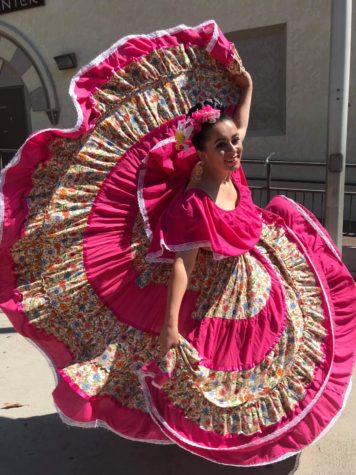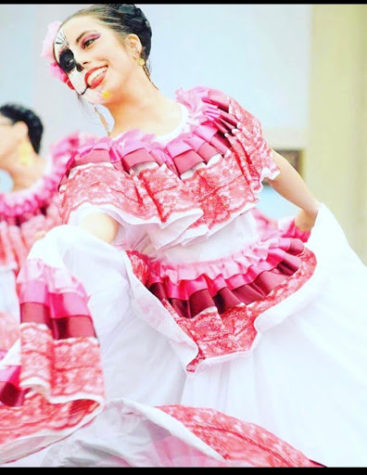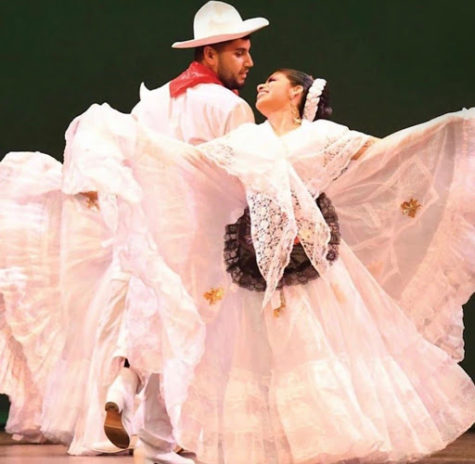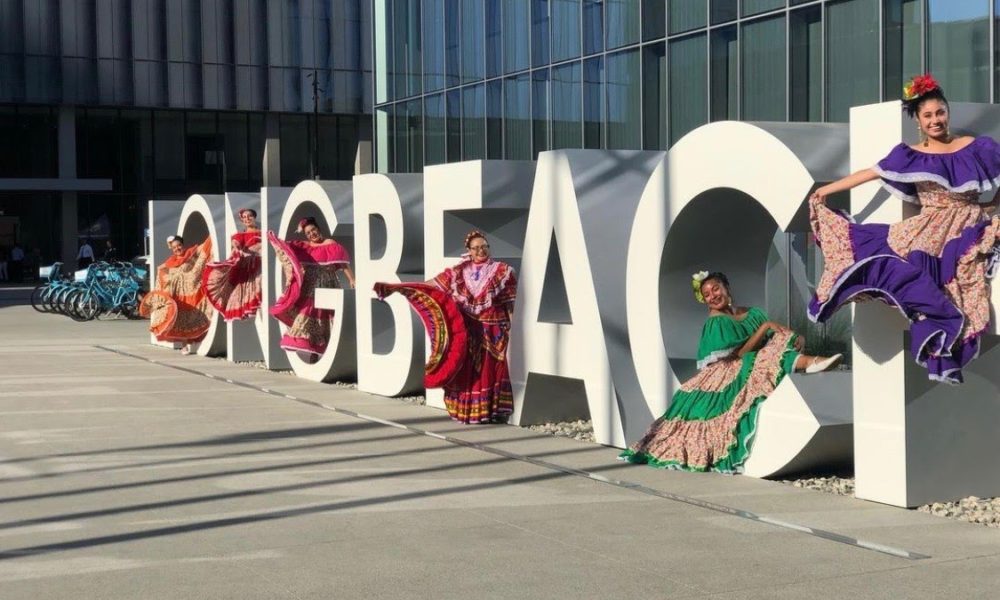On Friday evenings, the Lara family typically spends their night trying to ignore the thumps echoing from one of their upstairs bedrooms. By now, this experience has become a weekly routine.

Jasmine Lara is used to getting noise complaints from her family about her Friday folklórico practices since Long Beach State moved to virtual instruction and campus clubs were forced to halt in-person activities.
“I have two younger siblings and then my parents at home, and when I’m practicing I’m usually doing a lot of footwork,” Lara said. “They like to be downstairs and they’ll always tell me, ‘We can hear you stomping, you’re so loud.’ Now I tell them, ‘Look, on Fridays, I’ll be practicing. So just warning you, if you hear footsteps or stomping, that’s me’.’”
Lara, a fourth-year health science major, is one of the many dancers in CSULB’s Grupo Folklórico Mexica.
Folklórico, a traditional Mexican dance celebrating the different aspects of Mexican culture and the many regions in Mexico, is a passion Lara had since she was about 6six years old. In her first semester at CSULB, she immediately joined Grupo Folklórico Mexica.
The club she has loved and performed with for four years can no longer dance at community events nor showcase the dances they’ve spent all semester perfecting. Instead, they’ve moved to virtual practices and dance strictly from home.
Lara said that the switch to virtual instruction was challenging in ways she never expected. She is unable to physically spend time with her friends from the club, and due to unstable internet connection, Zoom will lag and disrupt their practice.
“I’ve had times when the music’s playing and it just stops because my whole internet is just kind of disconnecting,” Lara said. “It’s little challenges like that with being online that are frustrating.”
Lara said that even though this semester’s experience is different, these practices have given her an outlet to destress and take a break from feeling “locked up.”
But, virtual practices have not only been difficult for the group’s dancers. It has been difficult for instructors as well.

Jacqueline Santiago, a graduate student getting her master’s degree in curriculum and instruction, is one of the club’s directors.
She shared that the sudden switch to online instruction last semester left the group scrambling to create a structured virtual system.
When Santiago first joined Grupo Folklórico Mexica in 2013, she said that she never had any interest in folklórico and only joined a practice because of a friend. Although her friend never returned, Santiago kept attending and returned to the group when she came back to CSULB for graduate school.
According to Santiago, the biggest obstacle the group has encountered has been keeping members motivated. Santiago said that many dancers left the club when they moved virtual and that the club has not received the usual amount of participation this semester.
“Usually, the Michoacan dance gets around 40 dancers per year, but ever since it became virtual, we have just in between 15 to 17 dancers that have come back,” Santiago said.
The circumstances are not perfect, she said, but it’s important to keep folklórico alive at CSULB to help students disconnect from the reality of the pandemic and keep Latino students culturally aware. Santiago said it’s important for Mexican students to learn how dance styles, music and even dresses that folklórico dancers wear vary from region to region.
“Before joining folklórico, I just never took the time to educate myself about the different states of Mexico,” Santiago said. “Folklórico just basically introduces you to all of Mexico and to the beauty of all the states. My parents are from Mexico City, so from el distrito federal. But my dad’s side of the family, he’s from Guadalajara and in Guadalajara is the city of Jalisco, which is actually one of the regions our group dances.”
Alexis Santiago, a fifth-year Chicano and Latino studies and the younger sister of Jacqueline Santiago, is the president of Grupo Folklórico Mexica.
According to her, the club has long helped members build community with each other through dancing, but the difficulties they’ve experienced because of the pandemic have expanded the community in new ways and prepared them to keep the club alive for future generations of students.
“Getting this experience of moving virtual, it’s helping us grow as a group, so in case anything like this ever happens again, we’re the ones who are pioneering this new system,” Alexis Santiago said.
Since going virtual, the club has also reached out to folklórico clubs on other college campuses, including University of California, Los Angeles and California State University, Fullerton.

Alexis Santiago said that was one of the best outcomes of this entire experience.
“Reaching out to them just really helped all of us mentor each other with how we’re gonna move forward during this pandemic,” Alexis Santiago said.
After recently releasing a virtual showcase of their dancers, UCLA’s folklórico club has specifically mentored Grupo Folklórico Mexica to set up their own showcase this semester.
According to Jacqueline Santiago, the club is currently in the planning stages for their showcase and will present a proposal to the department of Club Sports and Recreation.
Alexis Santiago said that she hopes they get the greenlight to have an in-person or virtual showcase so Mexican students can stay connected to their heritage.
.“Especially as a Mexican American, it’s about reclaiming your own culture and helping it evolve as a dance because it’s a lot of interpreting our ancestors’ dances and making it into an art form in that sense,” Alexis Santiago said.
Grupo Folklórico Mexica has virtual practices every Friday from 5 p.m. to 8 p.m. and are still open to new members.




